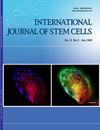胃有机体--胃干细胞稳态和治疗应用的前景模型
IF 2.4
4区 医学
Q3 CELL & TISSUE ENGINEERING
引用次数: 0
摘要
要阐明各种疾病的病理生理学,就必须开发能忠实模拟体内条件的研究平台。事实证明,二维细胞培养和动物模型等传统模型系统不足以捕捉人类疾病模型的复杂性。然而,最近在类器官培养系统方面取得的进展为理解胃干细胞稳态和相关疾病(尤其是胃癌)开辟了新途径。鉴于胃癌的重要性,彻底了解其病理生理学和分子基础势在必行。为此,利用源自患者的类器官库成为一个重要的平台,因为它能忠实反映患者的特异性特征,包括突变特征和药物敏感性。此外,对胃癌类器官进行遗传操作有助于探索胃癌发展的分子机制。本综述全面概述了各种成体干细胞衍生胃有机体模型的最新进展及其多样化应用。本文章由计算机程序翻译,如有差异,请以英文原文为准。
Gastric Organoid, a Promising Modeling for Gastric Stem Cell Homeostasis and Therapeutic Application.
The elucidation of the pathophysiology underlying various diseases necessitates the development of research platforms that faithfully mimic in vivo conditions. Traditional model systems such as two-dimensional cell cultures and animal models have proven inadequate in capturing the complexities of human disease modeling. However, recent strides in organoid culture systems have opened up new avenues for comprehending gastric stem cell homeostasis and associated diseases, notably gastric cancer. Given the significance of gastric cancer, a thorough understanding of its pathophysiology and molecular underpinnings is imperative. To this end, the utilization of patient-derived organoid libraries emerges as a remarkable platform, as it faithfully mirrors patient-specific characteristics, including mutation profiles and drug sensitivities. Furthermore, genetic manipulation of gastric organoids facilitates the exploration of molecular mechanisms underlying gastric cancer development. This review provides a comprehensive overview of recent advancements in various adult stem cell-derived gastric organoid models and their diverse applications.
求助全文
通过发布文献求助,成功后即可免费获取论文全文。
去求助
来源期刊

International journal of stem cells
Biochemistry, Genetics and Molecular Biology-Cell Biology
CiteScore
5.10
自引率
4.30%
发文量
38
期刊介绍:
International Journal of Stem Cells (Int J Stem Cells), a peer-reviewed open access journal, principally aims to provide a forum for investigators in the field of stem cell biology to present their research findings and share their visions and opinions. Int J Stem Cells covers all aspects of stem cell biology including basic, clinical and translational research on genetics, biochemistry, and physiology of various types of stem cells including embryonic, adult and induced stem cells. Reports on epigenetics, genomics, proteomics, metabolomics of stem cells are welcome as well. Int J Stem Cells also publishes review articles, technical reports and treatise on ethical issues.
 求助内容:
求助内容: 应助结果提醒方式:
应助结果提醒方式:


